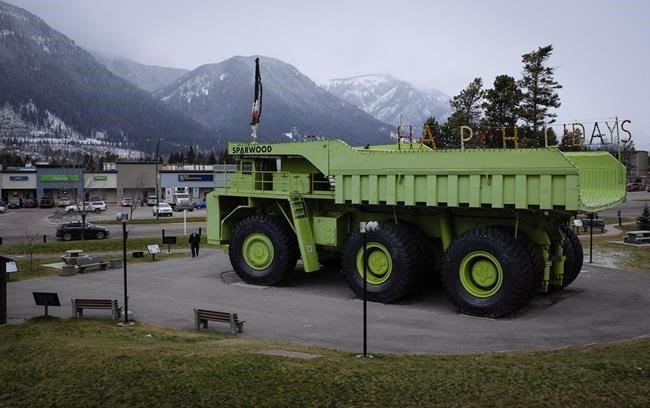
The coal mining town of Sparwood, B.C., is shown on Wednesday, Nov. 30, 2016. A British Columbia First Nation is celebrating a deal with a coal mining company that it says gives them veto power over a proposed development on its land.THE CANADIAN PRESS/Jeff McIntosh
Republished January 18, 2023 - 1:58 PM
Original Publication Date January 18, 2023 - 9:51 AM
A British Columbia First Nation is celebrating a deal with a coal company that gives it veto power over a proposed mine on its land.
"It's a new and, I want to say, better way of relationship-building with First Nations," said Chief Heidi Gravelle of the Tobacco Plains First Nation in southeast B.C.
Tobacco Plains has signed an agreement with NWP Coal Canada Ltd. over that company's Crown Mountain coal proposal that sets the band up as the project's environmental reviewer and regulator. The company, based in New Zealand and Australia, has agreed it won't go ahead unless the band gives its OK.
"We were brave enough to say we believe we can earn your 'yes' and we're willing to take your 'no' as a real no," said David Baines, NWP's director of project development.
"If we can't earn a yes from them we don't have a good enough proposal."
Crown Mountain, located near Sparwood, B.C., has been before federal and provincial regulators since 2014. It's one of a number of steelmaking coal projects proposed for the area that created environmental concerns for the Ktunaxa Nation Council, a group of four First Nations that includes Tobacco Plains.
In 2021, those concerns caused the council to ask government regulators to stop the review processes, from which it withdrew. Early next year, NWP decided to see if it could get talks going again.
"There started to be a movement among business and industry to see if we could talk to anyone who was willing to talk," Baines said.
That direct approach struck a chord.
"They came directly to our door," said Gravelle. "They had a little more understanding in terms of what it means to work with an Indigenous body."
Things moved quickly.
The first big meeting was held on Oct. 4. The deal was signed last Thursday.
Gravelle said the agreement puts Tobacco Plains in control of the environmental review.
"Typically, the environmental assessment has gone through B.C. and they have their processes and they set the standards. Things are changing."
The veto is not without conditions.
Before Tobacco Plains is entitled to deny the project, it is first obliged to work in good faith with NWP, said Mike McDonald, the lawyer who negotiated it.
"They have obligations to fully engage with the regulatory process and review the project to provide input prior to things being submitted to both regulators," McDonald said. "(Tobacco Plains must) engage directly with the regulators, almost like a partner with NWP."
NWP's board of directors had initial qualms about giving Tobacco Plains a veto, Baines said. But directors eventually decided that was the lower risk option.
"The board had concerns," he said.
"(But) living with the non-government-defined definition of meaningful engagement and having anger and court cases later is a risk. Having certainty in a process and respect for each other to earn that yes, to me, is a lesser risk."
The deal is no guarantee for Crown Mountain. Gravelle said the band wants changes in the plans.
"There are some areas where our elders say, 'Absolutely not.' We want to do things right by the land and everything it encompasses."
But Baines said the project itself makes agreement easier.
Crown Mountain is confined to a single valley. The coal is relatively shallow, reducing waste rock concerns. It's drained by a single stream, easing water management.
"The geology has given us a real opportunity to do things differently," he said.
McDonald said the deal is unique in the mining world. He said the circumstances of this project may limit its application in other negotiations.
"I don't think every Indigenous group must be offered this kind of thing."
But Gravelle said the deal sets a new standard for resource development on Indigenous land that goes far beyond what she calls the "typical crossing the i's and dotting the t's" of Indigenous consultation.
"We've never been asked for our consent in anything in the past," she said.
"It's setting a precedent. It's ensuring free, prior, informed consent is achieved."
It's the way of the future, she predicted.
"The ones that get it, that understand, they'll move forward in a good way," she said. "The ones that don't aren't going to go nowhere."
This report by The Canadian Press was first published Jan. 18, 2023.
News from © The Canadian Press, 2023